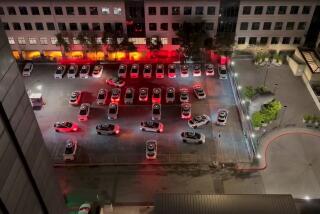Residents Facing a Noisy Assault Sound Their Complaints : Noise: The constant din of urban life is getting louder and becoming harder to tune out. It not only hurts the ears, but also damages nerves and neighborly relations.
- Share via
If you value your sanity, don’t spend time at Deborah Beere’s.
That advice comes from Beere herself, a person so undone by noise that she wants to move out of her West L.A. bungalow only three months after she rented it.
Beere keeps windows closed and fans humming at all times, but still gets no relief. The personal trainer says she prays for clients to book 5:30 a.m. appointments so she can leave home “before the big morning noise.”
But the big morning noise on her residential street, which drivers use as an alternative to Wilshire Boulevard, blends into equally big afternoon noise, which continues through the night.
“Rush hour is the worst; then high-school kids who rev motors as they shout at one another, which makes drivers behind them honk their horns, which causes all the car alarms in the neighborhood to go off. All night long, people speed to the stop sign and screech to a halt. I awaken, heart pounding, a few times each night. By the time I get up, I’m worn out.
“It is my goal to find a peaceful place,” she says.
Lots of luck.
Peaceful spots are increasingly hard to find in Southern California as ear pollution--and the irritability and frustration that go with it--has surged in the past decade. In some parts of Los Angeles, noise-complaint calls to the police have doubled in just the past four years, says Sgt. Ken Hillman, officer in charge of the LAPD Noise Enforcement Team.
Hard figures on the noise increase aren’t available, Hillman says, because nobody keeps track of all the complaints that go to different agencies: airplane noise to airports, creature noise to animal regulation, freeway noise to Caltrans, plus thousands of calls from exasperated citizens to their local police and sheriff’s stations.
It seems there’s no end to the aural insults Angelenos now suffer, experts agree. Once a pastoral place where the nastiest sound was from a surfeit of crickets, Southern California now contends with helicopters, leaf blowers, car alarms, boomboxes, motorcycles, sirens, jets, buses, animals--the constant screech and rumble of machines (and people) too loud and too close for comfort.
Even the privileged, on bucolic plots, are accosted by sounds they never bargained for.
Paul Veneklasen, an acoustics expert in Pacific Palisades, bought a house in 1974 where he could hear birds singing, leaves rustling, waves splashing on sand. Now, he hears jet planes, the din of traffic from Sunset Boulevard three blocks away, and the ugly grind of trucks delivering goods to a recently built mall. Only at 2 a.m. can he still hear the sea kiss the shore.
That’s a lot better than what Paul Skermetta hears.
“Gunshots, sirens, screams, horns and medical helicopters all night long,” Skermetta gripes. His once-peaceful pad, high on a hill in Silver Lake, is so noisy now that if he leaves windows open he can’t hear his own TV. Even with windows closed, it’s too noisy for him to sleep.
So he has this bedtime routine: “On with the air conditioner, the oscillating fan, the machine that makes wave sounds and the one that makes white noise--a static drone that muffles almost everything.” But even multiple machines don’t hide the ruckus caused by “motorcycle nuts” who live nearby and rev their engines for at least five minutes every night at 1 a.m.: “Our whole street gets up, turns on the lights, opens the windows and shouts curses at them.”
Even in normally quiet Moorpark, in eastern Ventura County, residents weep in weariness, their sleep shattered nightly by engines of Metrolink trains in the nearby layover yard. “This is completely ruining my life,” Daniel Garcia told officials at a City Council meeting, at which point he dissolved into tears and left the room. He put the house where he has lived for 37 years up for sale. Things have improved, Garcia told The Times. Engines fire up at 4:15 a.m., instead of 3 a.m.
A group of Venice residents claims that the buses on the MTA’s Line 2, which roar past their homes every few minutes, create so much noise that their houses shake, dishes rattle on shelves, toddlers cannot sleep--and they cannot hear each other speak inside their own homes. They say the noise is not merely an annoyance, but a threat to mental and physical health.
Some officials disagree. “I worked on that complaint,” says one former aide to a local politician, who requested anonymity. “These people shouldn’t have bought homes on a bus route if they didn’t want noise. All big cities have noise; they should visit New York and see what those people endure.”
(For his information, Manhattanites’ tactic against cars with shrieking alarms is to bombard them with eggs dropped from high-rise windows.)
At the California Department of Transportation, Bill Minter’s phone rings endlessly with complaints from tight-lipped citizens angered by freeway noise that invades their homes. “Just spend one night in my bedroom,” they usually say, “and you’ll know why we need a sound wall built.”
But Minter, sound-wall project engineer and “keeper of the list” of scheduled projects, says he usually can’t help. “It costs as much to build a mile of sound wall as it once did to build a mile of freeway--$1.25 million.”
And Caltrans only builds walls for communities that existed before the freeway was built--or where the freeway has just been widened. And only if those communities have noise above a certain decibel level. And only if there are more than five houses affected by that noise. And only if they are next in line on the lengthy priority list.
Minter says many complain with good reason. “I’ve taken (very high) decibel readings at houses where the back porch isn’t even 25 feet from the freeway fence, and the upstairs bedrooms are level with road.” But he says residents bought the houses after the freeway was built--though before there were so many cars--so there’s “no way we can help them out.”
Do local codes allow homes to be built so close to the freeway?
Yes, Minter says. In fact, the noisy houses mentioned above, near the Hollywood Freeway in North Hollywood, were built on land Caltrans owned when it built the freeway. “We removed the existing homes and sold the vacant land because we considered it too close to the freeway for residential use.” A developer bought the property, built houses and sold them.
Similar tales come from officials at Los Angeles International, Van Nuys and Burbank airports, who say that developers buy land near airports because it is cheap, and they can “build more houses for a better price.” Consumers, seduced by the value, try to live with the noise level--and get very angry when it increases.
A spokesperson for Burbank airport says noise complaints have increased 200% in the past four years.
The good news, airport executives say, is that jets are quieter than they were 10 years ago, and the noise level will be lower yet as major airlines replace their older aircraft. Ridiculous, say scientists involved in noise research. By then air traffic will have doubled and the two factors will cancel each other out.
“As a matter of fact, it’s not an even trade,” says Dr. William Clark, senior scientist for the Central Institute for the Deaf in St. Louis. “Noise exposure is a function of both the sound level of an event and the number of events that occur. In other words, some people would be less disturbed by one loud plane every hour than they would be by many planes that are slightly less noisy.”
Does anyone really care what citizens are disturbed by?
Aside from the serious scientists, who say the “noise plague” in the United States endangers our hearing, our physical and mental health, and may further damage our balance of trade--because Europe and Japan are building ever quieter machines, while we continue to build noisy ones--the answer appears to be no.
Despite a maze of federal, state and local laws regulating noise levels that emanate from various sources, there are few funds for enforcement--and even fewer politicians who think the issue commands priority. It is not, after all, as dramatic a problem as homelessness or crime.
“The subject just isn’t sexy any more,” says a local official who requested anonymity. “It was a hot topic in the ‘60s and ‘70s. But ever since the Reagan Administration disbanded the noise-abatement office of the EPA in 1982,” he says, “noise has become a non-issue to all except those who suffer from it.”
Fred Mintz, a staff consultant on noise to the EPA, says: “I think the public needs to be educated about noise. Unfortunately, in the absence of funding, the agency is unable to carry out the mandates of the Environmental Protection Act.”
Many who try to get a grip on the subject find it is not simple.
“The problem with noise is that you’re talking straight physics,” says Frank Gomez, environmental health training coordinator for Los Angeles County. He says those who try to tackle the scientific subtlety of sound in order to help resolve community problems soon realize it is not amenable to glib discussion.
Noise, which satirical writer Ambrose Bierce described as “a stench in the ear,” is also more subjective than other pollutants. One person’s noise is another’s music. In 1990, an East Los Angeles man picked up his gun, marched upstairs and killed a neighbor who’d refused every night for weeks to lower the sound on his stereo.
Others seem able to tune out loud disturbances, but can’t tolerate the persistent drip of a faucet or the buzz of a mosquito.
There is no debate in the scientific community that noise, at certain decibel levels and for certain lengths of time, causes hearing loss.
Experts worry that Americans don’t understand their own vulnerability. They fail to protect their ears at work and at play. “Jet skis, motorcycles, off-road vehicles, target shooting and, most of all, amplified sound. That’s what causes problems today,” says county noise adviser Gomez.
He was in the mixing booth at a concert by the rock band Poison, he says, “and the noise levels averaged 105 to 107 decibels 100 feet from the stage, which is almost the level at which you feel pain.” But the kids loved it and didn’t worry about their ears.
Kathy Peck, a musician, worries for them. She says she “listened to a lot of loud music” and never thought twice about it until she and her group, the Contractions, opened for Duran Duran at a concert in Oakland Coliseum in 1984.
“I suddenly realized something was wrong,” she says. And it stayed wrong. Now, she has a 40% hearing loss that two hearing aids can’t totally correct. “Certain frequencies are totally lost; the hearing aid can only amplify what’s left.”
In 1988, to alert others to the problem, Peck started HEAR--Hearing Education and Awareness for Rockers--a San Francisco-based, nonprofit organization dedicated to the prevention of hearing loss.
“If you go to a concert and you’re anywhere near the speakers, wear earplugs,” she counsels. “That’s a definite plug zone” because the decibel level in rock rooms is way past the safety level. Don’t listen to loud music for long periods anywhere, any time for any reason, she continues. “Because there’s a price to pay later on. Your ears will start ringing, one of the first signs” that often signals damage for which there is no cure.
Peck and others counsel that anything over 80 decibels for long periods of time can do damage.
Sound, the scientists say, is a form of energy, which is why it has power to damage. It travels in waves of pressure, and hits the eardrum with a force measured in decibels.
Each increase of 10 decibels represents a tenfold increase in loudness. In other words, 100 decibels is not twice as loud as 50; it is 50 times as loud.
Clark explains how hearing loss occurs: “The eardrum is a little membrane that vibrates back and forth, with three tiny bones attached. The bones pass vibrations to the inner ear, which is a fluid-filled chamber with tiny hairs that are actually nerve cells. We are born with 16,000 of these sensory receptors. And every time we’re exposed to too much noise, some of them are killed. Dead. They never grow back.
“The kicker is this: Until you lose about 30% of the nerve cells, you don’t experience a hearing loss, so you can’t tell that damage has occurred.”
People suffer other ill effects from noise, scientists say. Studies suggest that people exposed to noise undergo changes in blood pressure, heart rate, cholesterol and adrenaline levels; that workers in noisy industries develop ulcers five times as frequently as others. Noise has been associated with cardiovascular and respiratory problems, low birth weight and fetal development problems.
Because research funding has dried up, little work is ongoing to explore possible direct links between noise and physical illness. Indirect links are indisputable--but much more research needs to be done, says Arline Bronzaft, environmental psychologist and chairperson of the Noise Committee for the Council on the Environment of New York City. “The strongest evidence so far is in the area of noise affecting the cardiovascular system.”
One of Bronzaft’s own studies, completed in 1981, involved a New York school in which half of the sixth-grade students faced noisy elevated train tracks; the other half was in a room on the quiet side of the building. Bronzaft found that for four successive years, students on the noisy side were a year behind those on the quiet side.
After noise-abatement changes were made, Bronzaft tested students for two more years and found the scores were equal.
In a Los Angeles study, Sheldon Cohen, a psychology professor at Pittsburgh’s Carnegie-Mellon Institute, found that children attending noisy elementary schools near LAX had higher blood-pressure readings than those in control groups at quieter schools.
Researchers also have found that people are less inclined to help others in a noisy environment. One study involved a scientist who “accidentally” dropped books on the ground while a loud lawn mower was being used nearby. Passersby did not stop to help while the mower was on, but did stop to help when the area was quiet.
Scientists say the fascinating thing about sound is that you can never get away from it. You can close your eyes or your mouth, but you can’t close your ears.
Dan Johnson, astronautical engineer and chairman of the committee on noise of the American Acoustical Society, says, “Even if you go to the quietest place in the world, you can’t get away from sound. In the absence of anything else, you will hear your own heartbeat, your own pulse rushing . . . your own body noises. There is no such thing as silence for a normal hearing person unless you’re dead.”
More to Read
Sign up for Essential California
The most important California stories and recommendations in your inbox every morning.
You may occasionally receive promotional content from the Los Angeles Times.










